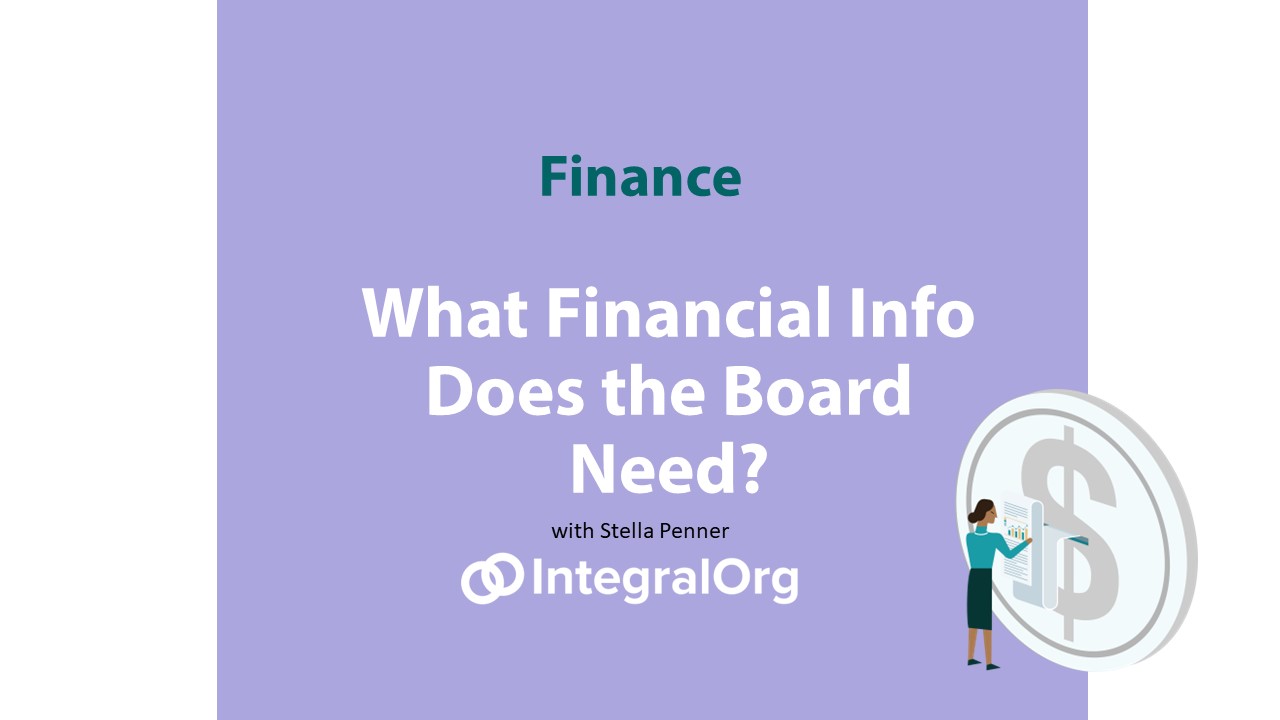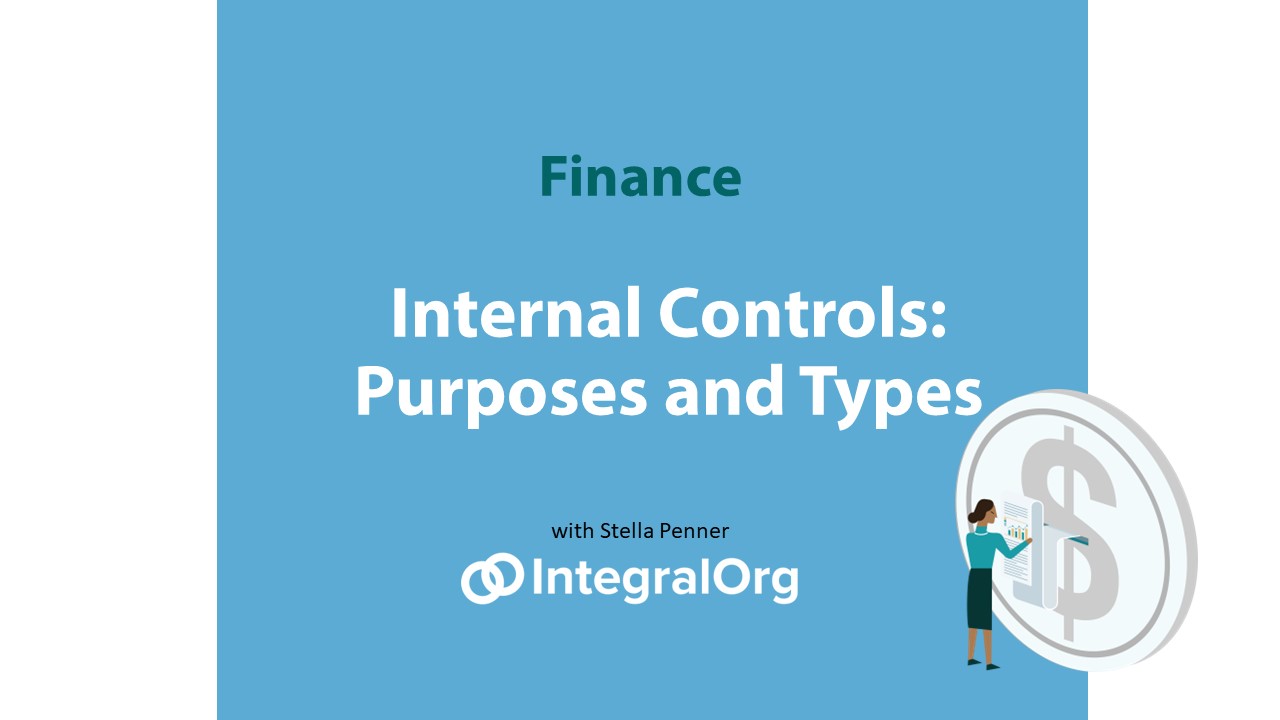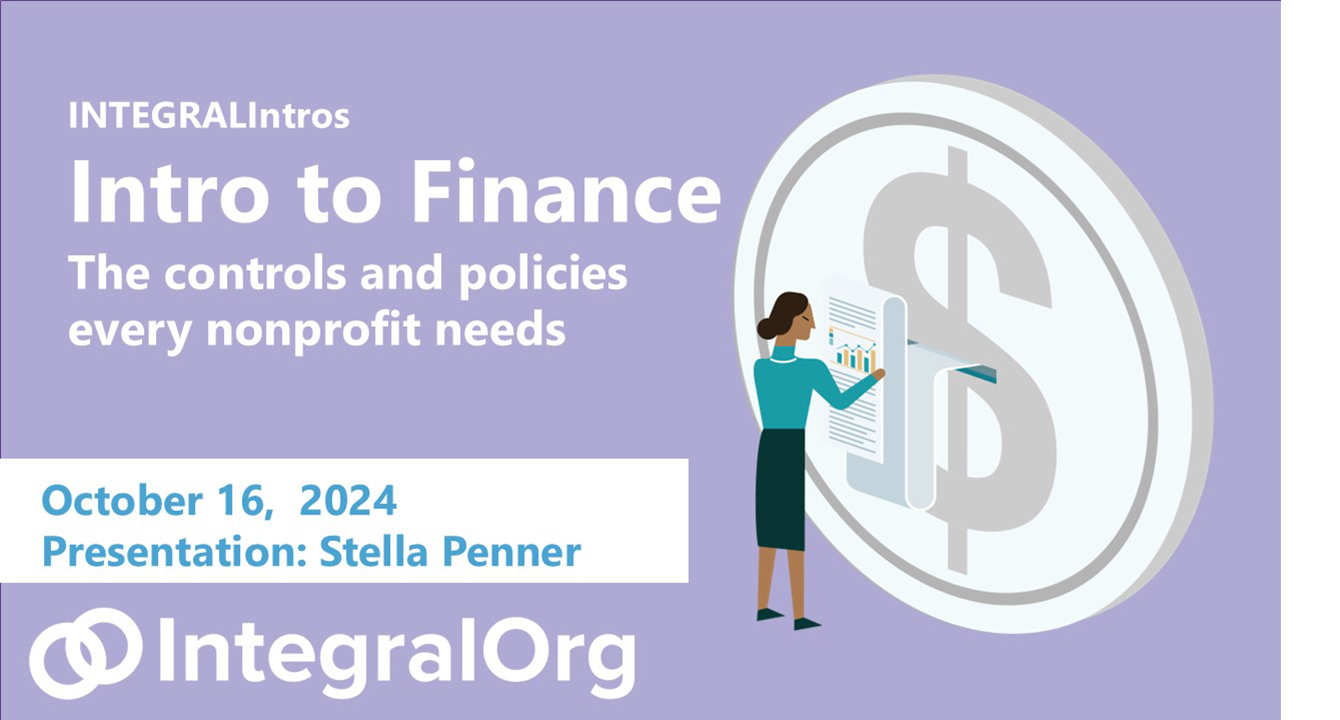Financial Management
When you are running a nonprofit, financial management is a vital - and sometimes overwhelming - responsibility. There are roles and responsibilities to determine, controls to put in place, policies to create, and budgets to prepare and follow.
The size of your organization may affect the resources you have available for financial management. A large nonprofit might have a finance team while a smaller nonprofit may have an individual who has many other responsibilities. No matter the size of your organization, the board and staff have distinct and important roles in financial management.
Check out the financial management services, videos, and resources below.
 Video: Budgeting: Roles of the Board, Treasurer, and Bookkeeper (5:44) The board is responsible for oversight, stewardship, risk assessment, monitoring, and planning. The treasurer advises the board, finance committee, and management and is a liaison between board and auditor. The bookkeeper or accountant provides financial information to the executive director.
Video: Budgeting: Roles of the Board, Treasurer, and Bookkeeper (5:44) The board is responsible for oversight, stewardship, risk assessment, monitoring, and planning. The treasurer advises the board, finance committee, and management and is a liaison between board and auditor. The bookkeeper or accountant provides financial information to the executive director.
 Video: Budgeting:What Financial Information Does the Board Need? (9:48) This video outlines the financial information that the board needs. Essentially, the board needs enough financial information to be clear about these three questions: "Where are we now?, Where are we going? How do we plan and monitor?
Video: Budgeting:What Financial Information Does the Board Need? (9:48) This video outlines the financial information that the board needs. Essentially, the board needs enough financial information to be clear about these three questions: "Where are we now?, Where are we going? How do we plan and monitor?
 Video: Budgeting: Internal Controls: Purposes and Types (11:34) Why do we need internal financial controls in our organizations? Reasons include so that we can implement management policies, protect assets, mitigate risk, and find efficiencies. A healthy financial management system has both general entity-wide controls and specific application controls.
Video: Budgeting: Internal Controls: Purposes and Types (11:34) Why do we need internal financial controls in our organizations? Reasons include so that we can implement management policies, protect assets, mitigate risk, and find efficiencies. A healthy financial management system has both general entity-wide controls and specific application controls.
 Video: Budgeting as a Financial Control (2:01) A budget is a financial control that forces you to plan ahead. The budgeting process allows your organization to determine: What are out priorities? What activities will achieve these priorities? Where is the revenue for activities coming from? How much will it cost to do these activities?
Video: Budgeting as a Financial Control (2:01) A budget is a financial control that forces you to plan ahead. The budgeting process allows your organization to determine: What are out priorities? What activities will achieve these priorities? Where is the revenue for activities coming from? How much will it cost to do these activities?
 Video: Audits: A Brief Introduction to Audits for Nonprofits (4:59) A short introduction to nonprofit audits and why your nonprofit might need one. Nonprofit and charities are under more scrutiny than ever before. Every stakeholder – from grantors and board members to the public media – expects nonprofit and charitable organizations to uphold their mission in a financially responsible way. And an audit can help demonstrate that!
Video: Audits: A Brief Introduction to Audits for Nonprofits (4:59) A short introduction to nonprofit audits and why your nonprofit might need one. Nonprofit and charities are under more scrutiny than ever before. Every stakeholder – from grantors and board members to the public media – expects nonprofit and charitable organizations to uphold their mission in a financially responsible way. And an audit can help demonstrate that!
 Video: GST: When Does My Organization Need to Collect GST? (5:27) It goes without saying that GST rules are complex - and they are different for nonprofits than they are for charities. In this short video, a nonprofit/charity GST expert explains how to know whether your organization needs to collect GST.
Video: GST: When Does My Organization Need to Collect GST? (5:27) It goes without saying that GST rules are complex - and they are different for nonprofits than they are for charities. In this short video, a nonprofit/charity GST expert explains how to know whether your organization needs to collect GST.
Get Help with Financial Management
IntegralOrg has a range of custom services that can help your nonprofit develop effective financial management processes.
Free Consultation or Financial Clinic
Consultation: If you have a question about financial management of your nonprofit, we are happy to offer our expertise through a free consultation. For example, you may want ideas or advice on budgeting, GST, internal and external controls, or financial reporting.
To arrange a consultation, give us a call at 403-910-7279, connect by email, or use the Contact Us form and we will arrange a phone or virtual meeting with a member of our team.
Organizational Development Services
If you have a need for in-depth solutions IntegralOrg can work directly with your nonprofit. We work alongside your organization, through customized supports that assist you on your journey as a nonprofit. Please contact us at 403-910-7279 or connect by email. Organizational development is undertaken on a fee-for-service basis.
Review of Organizational Financial Management
A complete review of the financial area of your organization including governance and policies, administration, systems (including review of software currently in use), controls, and procedures. This includes CRA compliance with respect to the financial reporting (T3010) and tax receipting.
Financial Reporting Review
Financial reporting can be complex. The Canada Revenue Agency (CRA) requires all nonprofits to submit an annual filing that includes financial information. Exactly what needs to be submitted is determined by the legislation your organization is formed under.
Specifically, a nonprofit that is not a registered charity and has assets over $200,000 or receives certain investment income over $10,000 must file Form T1044 annually. If nonprofit is incorporated but not a registered charity, it must file a T2 Corporate Tax Return annually. A nonprofit that is a registered charity must file Form T3010.
IntegralOrg can assist your organization via a review of your policies, systems, and processes related to required CRA reporting.
Audit Preparation Review
Some nonprofit organizations are required to submit audited financial statements. An audit is a systematic and independent examination of an organization's books and accounts to determine if financial statements are a true representation of financial position. IntegralOrg can assist your organization with a review of your processes, systems, and board and leadership roles and responsibilities of an audit.
Learn about Financial Management
INTRO to Finance: The controls and policies every nonprofit needs
 This workshop provides an overview of the basics of nonprofit financial responsibilities, controls, and policies including: the respective roles of the board, the treasurer and the bookkeeper or accountant; financial information that the board needs to make informed financial decisions; the purpose of “internal controls” and key controls to put in place; and how budgeting relates to internal controls. This workshop was held on October 16, 2024. Watch the video on-demand, plus get slides and resources.
This workshop provides an overview of the basics of nonprofit financial responsibilities, controls, and policies including: the respective roles of the board, the treasurer and the bookkeeper or accountant; financial information that the board needs to make informed financial decisions; the purpose of “internal controls” and key controls to put in place; and how budgeting relates to internal controls. This workshop was held on October 16, 2024. Watch the video on-demand, plus get slides and resources.
Financial Management Workshops
IntegralOrg offers workshops on nonprofit finance and other topics important to nonprofits including INTEGRALIntro introductory workshops.
Preparing for Your Nonprofit Audit
Wednesday, October 30, 2024, 1-2:30pm
Nonprofits and charities are under more scrutiny than ever before. Every stakeholder – from grantors and board members to the public media – expects nonprofit and charitable organizations to uphold their mission in a financially responsible way.
Not sure if your organization needs an audit? Check out the short video below in which instructor Stella Penner provides a brief introduction to audits.
You will learn from an accountant with decades of nonprofit and teaching experience about the ins and outs of the auditing process with added time for any participant questions. This webinar is suitable for anyone who has a hand in your organization’s finances: senior leadership or board and audit committee members. During the session, we'll discuss such topics as:
- Differing roles in the audit process: the auditor, the board or finance committee and management.
- What to expect ahead of, during, and after the audit and the typical timeline from start to finish.
- Why does the auditor ask so many questions?
- Is there anything we can do to improve the efficiency of the process and help keep fees reasonable?
Cost: $10-30. We recognize that smaller organizations lack equitable access to the financial resources needed for professional development. We have provided 3 ticket pricing options that provide full access to the workshop. We invite you to choose a rate that is best aligned with your ability to pay.
![]() Video: A Brief Introduction to Audits for Nonprofits (4:59)
Video: A Brief Introduction to Audits for Nonprofits (4:59)
Trainer Stella Penner, FCPA, FCGA, CA, has decades of experience providing financial reporting and governance support to charities and nonprofits. Previously, Stella held various roles in professional development and as a full-time instructor in financial and management accounting, audit, finance, and organizational design and analysis at universities and colleges in Edmonton and Calgary. Stella also has executive experience as a prior CEO of CGA Alberta.
Resources
A Guide to Financial Statements of Not-for-Profit Organizations: Questions for Directors: Chartered Professional Accountants of Canada
Annual Returns for Corporations, Cooperatives, and Organizations: Government of Alberta.
Not-for-profit Audit Committee Guidebook: Grant Thornton